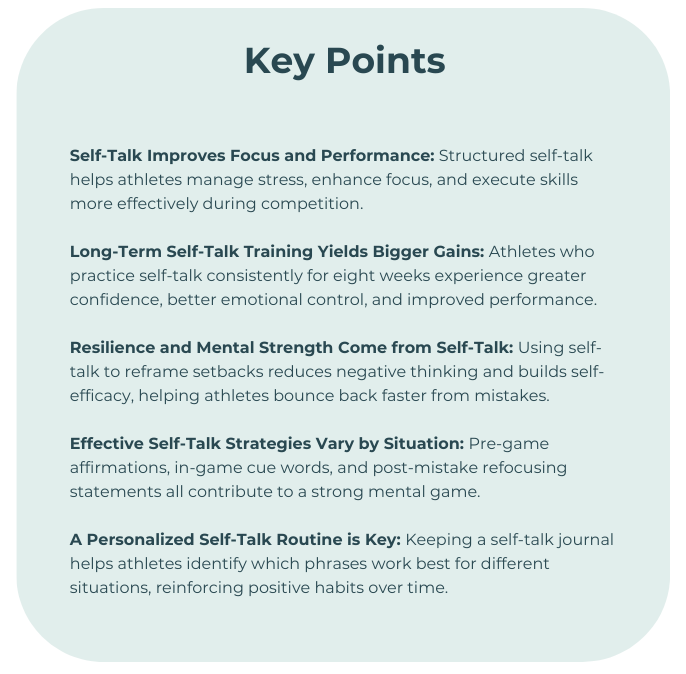Using Self-Talk to Overcome Athletic Challenges and Boost Performance
What to Consider When Reading
How does your current inner dialogue impact your confidence and performance under pressure?
What specific self-talk phrases could you integrate into your pre-game routine to boost mental preparation?
Athletes train their bodies relentlessly to perform at their best—but what about their minds?
The words you say to yourself before a game, during a competition, or after a mistake can make the difference between winning and losing. Research has shown that self-talk isn’t just motivational fluff—it has real, measurable effects on performance, anxiety, and confidence.
A recent study by Walter, Nikoleizig, and Alfermann (2019) explored how structured self-talk training can help junior sub-elite athletes improve their self-efficacy, volitional skills, and competitive performance. The results? Self-talk can significantly lower competitive anxiety, increase confidence, and enhance overall performance. And the longer athletes practiced self-talk, the greater the benefits. Here’s what you need to know.
1. How Self-Talk Can Help You Perform Better
The study found that athletes who engaged in self-talk training experienced major improvements in their ability to manage stress and focus under pressure. Specifically:
Somatic anxiety (physical tension, nerves) decreased in athletes who practiced self-talk.
Self-confidence increased, especially in those who trained with self-talk techniques for eight weeks.
Athletes became better at setting and pursuing performance goals, which helped them stay motivated during training and competition.
Coaches rated athletes who used self-talk more highly in skill execution and overall performance.
Try this: Next time you’re feeling pressure before a game, take control of your inner dialogue. Instead of saying, I hope I don’t mess up, reframe it as, I’ve trained hard for this, and I’m ready.
2. Long-Term Self-Talk Training Leads to Bigger Gains
The study compared short-term self-talk training (one week) and long-term self-talk training (eight weeks). While both groups showed improvement, the long-term group had significantly better and more lasting results.
Their self-confidence continued to increase even after the training ended.
They maintained better focus and emotional control compared to the short-term group.
Their overall performance improved more significantly, as rated by their coaches.
Try this: If you want to use self-talk to improve your game, commit to a structured routine for at least eight weeks. Consistency is key—integrate self-talk into training, pre-game rituals, and in-game moments.
3. Using Self-Talk to Build Resilience
Beyond performance, self-talk helps athletes develop mental resilience, which is crucial for bouncing back from mistakes and setbacks.
Self-optimization improved, meaning athletes got better at setting and following through on goals.
Negative thinking decreased, allowing athletes to recover from challenges more quickly.
Self-efficacy (the belief in one’s ability to succeed) increased, which led to more motivation and stronger performances.
Try this: After a setback, use self-talk to reframe failure as feedback. Instead of thinking, I’m not good enough, say, That was a tough moment, but I can learn from it and come back stronger.
4. Practical Ways to Use Self-Talk in Your Training
To maximize the benefits of self-talk, athletes should use a structured approach tailored to their specific needs. Here are some effective ways to incorporate self-talk into your routine:
Pre-game prep: Use positive affirmations before competition (e.g., I am ready. I trust my training.)
During training: Create cue words to stay focused (e.g., Explosive push-off in sprinting or Follow through in shooting sports).
During competition: When feeling stressed, use calming self-talk (e.g., Breathe. Stay in control.)
After mistakes: Instead of self-criticism, use self-talk to refocus (e.g., Shake it off. Next play.)
Try this: Keep a self-talk journal and write down the phrases that work best for you in different situations. Over time, you’ll build a library of powerful, personalized self-talk statements that enhance your confidence and performance.
Conclusion: Self-Talk is a Game-Changer
Self-talk is more than just a psychological trick—it’s a science-backed strategy that can improve confidence, reduce anxiety, and enhance performance. The key takeaways from this study?
Self-talk training helps athletes perform better by lowering anxiety and boosting confidence.
The longer you practice self-talk, the more effective it becomes.
Structured self-talk routines can help you stay resilient, focused, and mentally tough.
The best athletes don’t just train their bodies—they train their minds. Are you ready to start using self-talk to take your performance to the next level?
Want to Develop a Stronger Mental Game?
If you’re looking to integrate elite-level mental skills training into your routine, consider working with a mental performance consultant. Learning how to use self-talk effectively could be the key to unlocking your full potential.
